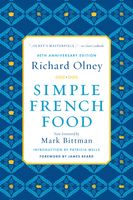Advertisement
Dry Heat: Roast and Grilled Meats
Chaleur Sêche: Viandes Rôties et Grillées
Appears in
Published 1974
An uncomplicated roast is better cooked before an open fire than in an oven, probably because it turns in a dry open air unoppressed by vapors and condensations of moisture, although, just as a fireplace that does not smoke will perfume a room deliciously with the odor of burning wood, the flames, their smoke rising with only their heat radiating outward, undoubtedly alter the flavor in a delicately different way from the heat of an oven.
But so many things influence taste . . . The eloquence of a roast slowly turning before living flames, its visible transfiguration as it contracts, swells, and, fondled by repeated basting, assumes a luxuriant brown satin glaze, has an entrancing effect on a company. If a leg of lamb spitted in a fireplace seems more succulent than its delicious counterpart roasted in an oven, so much the better—nothing, in any case, ever tastes better than it is (in the absence of euphory, things rarely taste as good as they are . . .); perhaps the ritual beauty of the thing and the excitement and suspense it engenders collaborate to rivet attentions and sharpen palates in the service of total appreciation. I remain convinced of the matter-of-fact superiority of a roast cooked in this way; beyond the fireplace, the turnspit, and something to serve as a dripping pan, no special equipment is essential—although an upright grill within the fireplace, designed to hold the burning logs, provides a more manageable source of heat—a solid face of flames—than a fire built on the hearth itself. The intensity of the heat is controlled by adjusting the distance of the spit from the source of heat.

